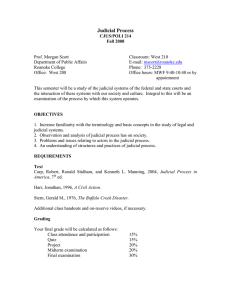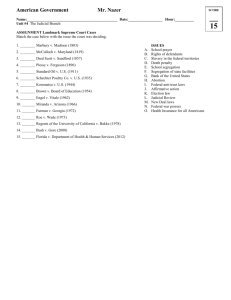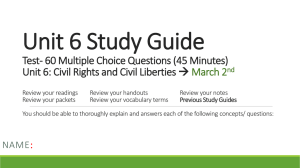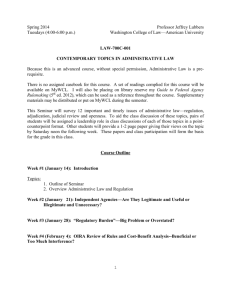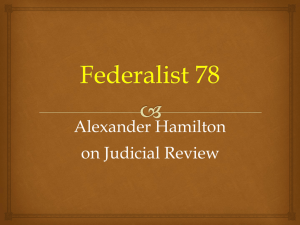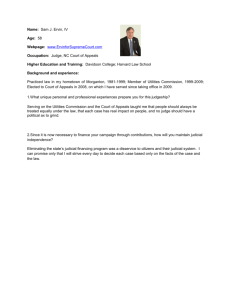Scott, Gregory M. & Stephen M. Garrison. The
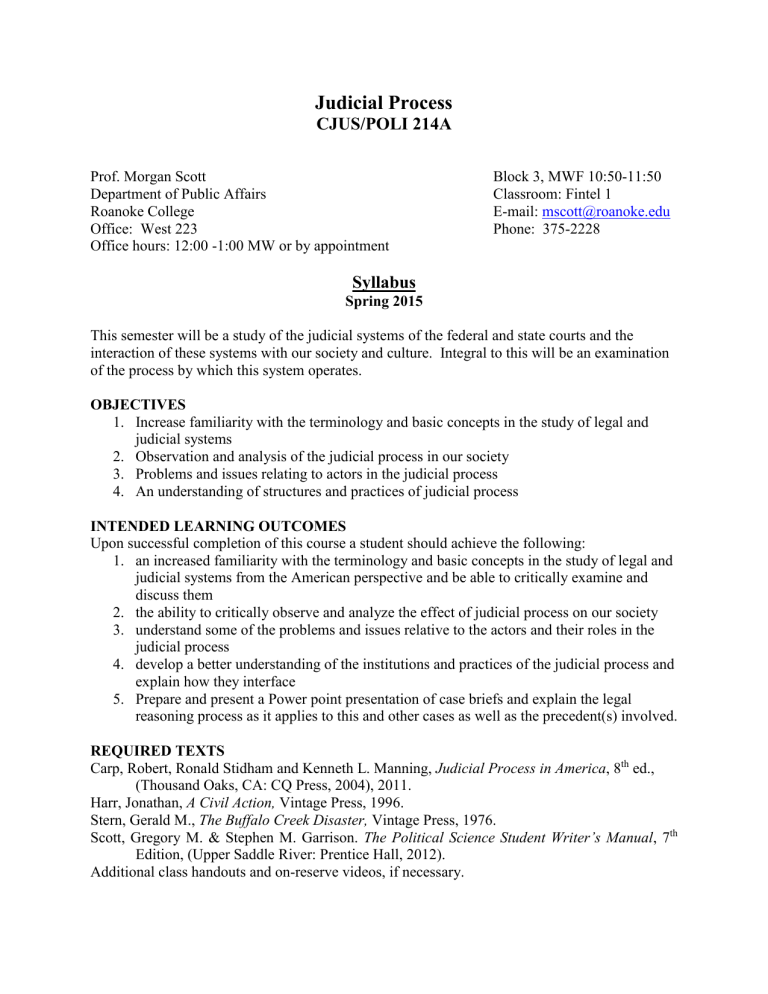
Judicial Process
CJUS/POLI 214A
Prof. Morgan Scott
Department of Public Affairs
Roanoke College
Office: West 223
Office hours: 12:00 -1:00 MW or by appointment
Block 3, MWF 10:50-11:50
Classroom: Fintel 1
E-mail: mscott@roanoke.edu
Phone: 375-2228
Syllabus
Spring 2015
This semester will be a study of the judicial systems of the federal and state courts and the interaction of these systems with our society and culture. Integral to this will be an examination of the process by which this system operates.
OBJECTIVES
1.
Increase familiarity with the terminology and basic concepts in the study of legal and judicial systems
2.
Observation and analysis of the judicial process in our society
3.
Problems and issues relating to actors in the judicial process
4.
An understanding of structures and practices of judicial process
INTENDED LEARNING OUTCOMES
Upon successful completion of this course a student should achieve the following:
1.
an increased familiarity with the terminology and basic concepts in the study of legal and judicial systems from the American perspective and be able to critically examine and discuss them
2.
the ability to critically observe and analyze the effect of judicial process on our society
3.
understand some of the problems and issues relative to the actors and their roles in the judicial process
4.
develop a better understanding of the institutions and practices of the judicial process and explain how they interface
5.
Prepare and present a Power point presentation of case briefs and explain the legal reasoning process as it applies to this and other cases as well as the precedent(s) involved.
REQUIRED TEXTS
Carp, Robert, Ronald Stidham and Kenneth L. Manning, Judicial Process in America , 8 th ed.,
(Thousand Oaks, CA: CQ Press, 2004), 2011.
Harr, Jonathan, A Civil Action, Vintage Press, 1996.
Stern, Gerald M., The Buffalo Creek Disaster, Vintage Press, 1976.
Scott, Gregory M. & Stephen M. Garrison.
The Political Science Student Writer’s Manual
, 7 th
Edition, (Upper Saddle River: Prentice Hall, 2012).
Additional class handouts and on-reserve videos, if necessary.
GRADING
Your final grade will be calculated as follows:
Class attendance and participation
Briefs and presentation
Midterm examination
Final examination
GRADING SCALE
A
A-
B+
B
93-100
90-92
87-89
83-86
B- 80-82
C+ 77-79
C 73-76
C- 70-72
D+ 67-69
D 63-66
D- 60-62
F 0-59
20%
25%
25%
30%
ATTENDANCE POLICY
Note that class participation and attendance constitute 20% of your final grade. My lectures are designed to build upon, not repeat the reading assignments and consistently missing class will deprive you of lectures, demonstrations and discussions that are critical to your understanding of the course and success on examinations. Roll will be called **Attendance will be taken**. If you are not in your seat at the beginning of the day’s lecture, you will be counted absent. Each student has two unexcused absences this semester. You may use those without having your class participation and attendance grade affected. All other absences must be excused by the instructor or your attendance and attendance grade will be lowered. N.B. If you have more than three unexcused absences I will notify you and the Registrar and seek to drop you from the course if you have an additional absence. If you have no absences—excused or unexcused—I will add three points to your final exam grade. You are expected to read ahead in the text as assigned and prepare for class. You are expected to participate in class discussions and exercises. Expect to be called on in every class. Civility is required of all. Please note again that the lectures and class discussions are meant to supplement your reading of the text.
ACADEMIC INTEGRITY
Students are expected to follow the integrity policy detailed in the handbook Academic Integrity at Roanoke College . Additionally, if you are ever uncertain as to how the College’s policy pertains to any assignment or exam in this course, please ask me for clarification. The bottom line is that all work that a student submits for a grade must be solely the work of that student unless the instructor has given explicit permission for students to work together.
Please familiarize yourself with Roanoke College’s Academic Integrity System which can be found in the Student Handbook. Pay special attention to the discussion on plagiarism. It is your responsibility to know the rules regarding Academic Integrity.
MAKEUP TEST POLICY
The opportunity to make up a test is at the discretion of the instructor. Any excuse should be properly documented and is subject to verification. If a makeup test is allowed, then it is the responsibility of the student to schedule the test within the next week of classes on a date, time and location agreeable to the instructor.
ELECTRONIC DEVICES
All electronic devices must be turned off prior to entering the classroom. Any use of such devices during a quiz or exam will be considered a breach of academic integrity. Should a cell phone ring during class, the first offense will result in the offender buying donuts for the entire class. The second offense will result in the offender being excused from class.
THE OFFICE OF DISABILITY SUPPORT SERVICES , located in the Goode-Pasfield
Center for Learning and Teaching in Fintel Library, provides reasonable accommodations to students with identified disabilities. Reasonable accommodations are provided based on the diagnosed disability and the recommendations of the professional evaluator. In order to be considered for disability services, students must identify themselves to the Office of Disability
Support Services. Students requesting accommodations are required to provide specific current documentation of their disabilities. Please contact Rick Robers, M.A., Coordinator of Disability
Support Services, at 540-375-2247 or e-mail robers@roanoke.edu
.
If you are on record with the College's Office of Disability Support Services as having academic or physical needs requiring accommodations, please schedule an appointment with Mr. Robers as soon as possible. You need to discuss your accommodations with him before they can be implemented. Also, please note that arrangements for extended time on exams, testing, and quizzes in a distraction-reduced environment must be made at least one week before every exam .
It is your responsibility to make arrangements and appointments for this testing.
CENTER FOR LEARNING & TEACHING
THE WRITING CENTER @ ROANOKE COLLEGE , located on the lower level of Fintel
Library, offers tutorials focused on written and oral communication for students working on assignments and projects in any field. Writers at all levels of competence may visit the Writing
Center at any point in their process, from brainstorming to drafting to editing, to talk with trained peer tutors in informal, one-on-one sessions. The Writing Center is open Sunday through
Thursday from 4-9 pm. Simply stop in, or schedule an appointment by going to www.roanoke.edu/writingcenter , where our schedule of writing workshops and creative writing playshops is also posted. Questions? Email writingcenter@roanoke.edu
or call 375-4949.
SUBJECT TUTORING is coordinated by Shannon McNeal at The Center for Learning &
Teaching . Tutoring sessions are held Sunday through Thursday, 4-9 p.m.
Subject Tutoring offers assistance in two formats:
Walk-In Tutoring: Walk-in tutoring is offered in a group setting for our most popular subjects:
INQ 240, Math 111 - 121, Spanish 101-201, Italian 101-201, French 101-201, Biology INQ-125,
Chemistry INQ - 222, and BUAD 215-225. Students may spend up to 1.5 hours with the tutor, or simply pop-in to ask a quick question. Regularly scheduled groups will be offered, Sunday -
Thursday: 4-5:30pm; 6-7:30pm; and 7:30-9pm Sunday-Thursday. Private Tutoring: Private
Tutors are only available upon request and appointments must be made 24 hours in advance for tutor notification. Private tutoring is available for our most popular subjects and for subjects that do not have a designated time on the Walk-In schedule. To view both schedules and to see a complete list of subjects, go to www.roanoke.edu/tutoring .
Please note: Your participation in this class is important to both your success and the success of the class. Come prepared. Expect to be called upon. Civility is required of all.
FINAL EXAM: Monday, April 27 th from 8:30 a.m-11:30 a.m.-in classroom. Plan your schedule accordingly. Exam is cumulative.
Schedule for POLI /CJUS 214A Judicial Process
SPRING 2015
Weeks One and Two: January 12-January 23
Carp text – Foundations of Law in the United States and the Federal Judicial System, pp. 1-51, The
Buffalo Creek Disaster, Part One; pp. 1-91.
Weeks Three and Four: January 26-February 6
Carp text – State Judicial Systems and Jurisdiction and Policy making Boundaries, pp. 53-99, The Buffalo
Creek Disaster, pp. 101-154.
Weeks Five and Six: February 9-February 20
Carp text – State Judges and Federal Judges, pp. 100-154, The Buffalo Creek Disaster, pp. 100-193 .
Week Seven: February 23-February 27
Links between the Citizenry, the President, and the Federal Judiciary and Lawyers, Litigants and Interest
Groups in the Judicial Process, Carp text - pp. 156-204, The Buffalo Creek Disaster, pp. 193-244.
February 27– MIDTERM EXAMINATION
Week Eight: February 28-March 8–Spring Break
Weeks Nine and Ten: March 9-March 20
Carp text – Crime and Procedures Prior to a Criminal Trial and the Criminal Trial and its Aftermath, pp.
206-268, The Buffalo Creek Disaster, pp. 244-end, A Civil Action , pp. 1-50 .
Presentation Assignments:
Weeks Eleven and Twelve: March 23-April 1 (Note: April 3 is Good Friday and there are no classes)
Carp text – The Civil Court Process, pp. 269-289. Presentations begin November 11 until completed.
Week Thirteen and Fourteen: April 6-April 17
Presentations until completed. Carp text – Decision Making by Trial Court Judges, pp. 290-328 and
Implementation of and Impact of Judicial Policies, pp. 374-398.
Week Fifteen: April 20:
Decision Making by Trial Court Judges and Implementation and Impact of Judicial Policies, Carp text, pp. 290-328 and pp. 374-398; Review.
N.B. While there is no daily reading assignment for “A Civil Action “you are responsible for completing the book prior to the final exam and there will be questions concerning the book on the final exam
FINAL EXAM Block 5: December 11 from 2-5pm. Exam is cumulative.
